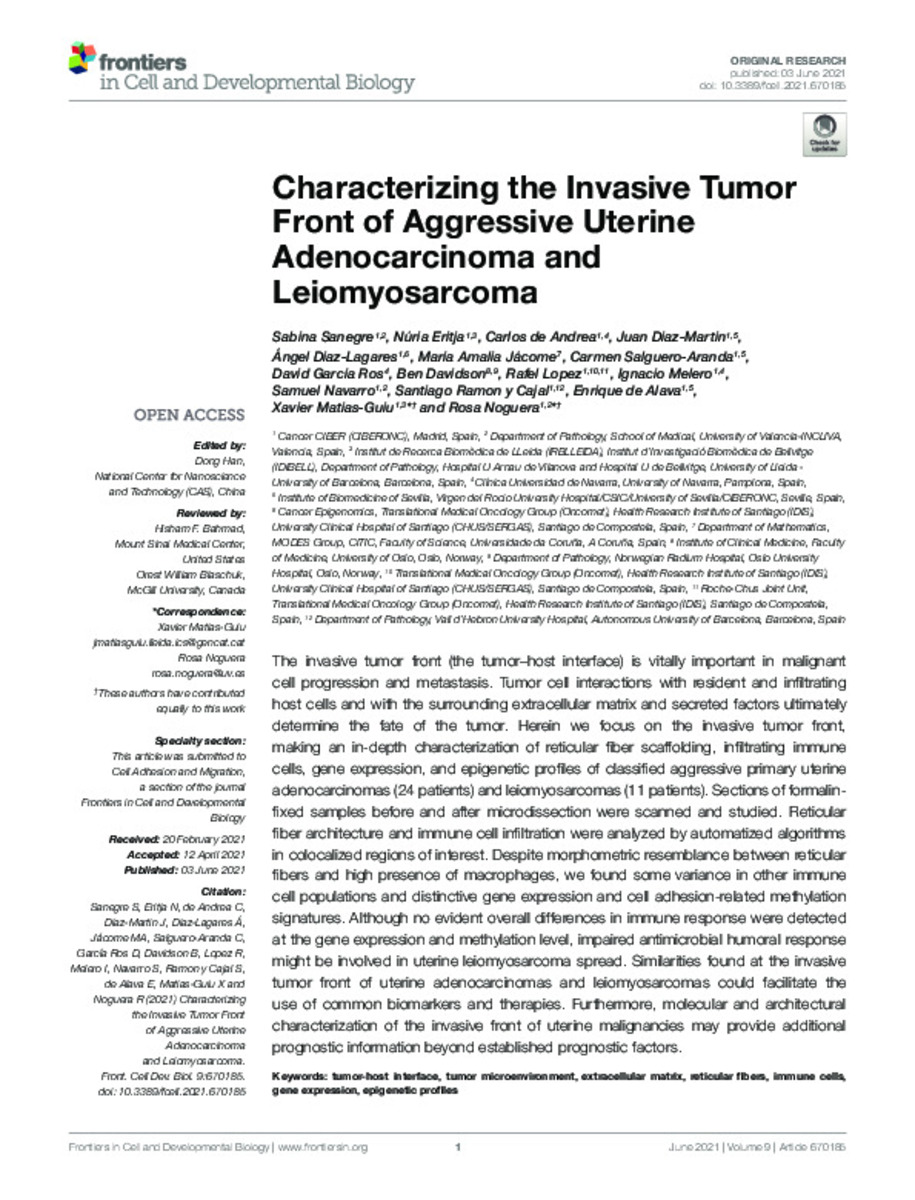Full metadata record
| DC Field | Value | Language |
|---|---|---|
| dc.creator | Sanegre, S. (Sabina) | - |
| dc.creator | Eritja, N. (Nuria) | - |
| dc.creator | Andrea, C.E. (Carlos Eduardo) de | - |
| dc.creator | Díaz-Martín, J. (Juan) | - |
| dc.creator | Diaz-Lagares, A. (Ángel) | - |
| dc.creator | Jácome, M.A. (María Amalia) | - |
| dc.creator | Salguero-Aranda, C. (Carmen) | - |
| dc.creator | Garcia-Ros, D. (David) | - |
| dc.creator | Davidson, B. (Ben) | - |
| dc.creator | López, R. (Rafel) | - |
| dc.creator | Melero, I. (Ignacio) | - |
| dc.creator | Navarro, S. (Samuel) | - |
| dc.creator | Ramón-y-Cajal-Agüeras, S. (Santiago) | - |
| dc.creator | Alava, E. (Enrique) de | - |
| dc.creator | Matías-Guiu, X. (Xavier) | - |
| dc.creator | Noguera, R. (Rosa) | - |
| dc.date.accessioned | 2021-09-09T13:44:37Z | - |
| dc.date.available | 2021-09-09T13:44:37Z | - |
| dc.date.issued | 2021 | - |
| dc.identifier.citation | Sanegre, S.; Eritja, N.; De Andrea, C. (Carlos Eduardo); et al. "Characterizing the invasive tumor front of aggressive uterine adenocarcinoma and leiomyosarcoma". Frontiers in Cell and Developmental Biology. 9, 2021, 670185 | es |
| dc.identifier.issn | 2296-634X | - |
| dc.identifier.uri | https://hdl.handle.net/10171/61981 | - |
| dc.description.abstract | The invasive tumor front (the tumor-host interface) is vitally important in malignant cell progression and metastasis. Tumor cell interactions with resident and infiltrating host cells and with the surrounding extracellular matrix and secreted factors ultimately determine the fate of the tumor. Herein we focus on the invasive tumor front, making an in-depth characterization of reticular fiber scaffolding, infiltrating immune cells, gene expression, and epigenetic profiles of classified aggressive primary uterine adenocarcinomas (24 patients) and leiomyosarcomas (11 patients). Sections of formalin-fixed samples before and after microdissection were scanned and studied. Reticular fiber architecture and immune cell infiltration were analyzed by automatized algorithms in colocalized regions of interest. Despite morphometric resemblance between reticular fibers and high presence of macrophages, we found some variance in other immune cell populations and distinctive gene expression and cell adhesion-related methylation signatures. Although no evident overall differences in immune response were detected at the gene expression and methylation level, impaired antimicrobial humoral response might be involved in uterine leiomyosarcoma spread. Similarities found at the invasive tumor front of uterine adenocarcinomas and leiomyosarcomas could facilitate the use of common biomarkers and therapies. Furthermore, molecular and architectural characterization of the invasive front of uterine malignancies may provide additional prognostic information beyond established prognostic factors. | - |
| dc.description.sponsorship | This research was supported by grants from the ISCIII and ERDF (PI17/01558 and PI20/01107), by the CIBERONC (contracts CB16/12/00484, CB16/12/0328, CB16/12/00363, CB16/12/00364, CB16/12/00481, and CB16/12/00231) and Grupos Coordinados Estables from the Asociación Española Contra el Cáncer (AECC). ÁD-L was funded by a contract “Juan Rodés” from the ISCIII (JR17/00016). The funders had no involvement in the research process nor in the preparation and submission of the article. | - |
| dc.language.iso | en | - |
| dc.rights | info:eu-repo/semantics/openAccess | - |
| dc.subject | Tumor-host interface | - |
| dc.subject | Tumor microenvironment | - |
| dc.subject | This is an open-access article distributed under the terms of the Creative Commons Attribution License (CC BY) | - |
| dc.subject | Extracellular matrix | - |
| dc.subject | Reticular fibers | - |
| dc.subject | Immune cells | - |
| dc.subject | Gene expression | - |
| dc.subject | Epigenetic profiles | - |
| dc.title | Characterizing the invasive tumor front of aggressive uterine adenocarcinoma and leiomyosarcoma | - |
| dc.type | info:eu-repo/semantics/article | - |
| dc.identifier.doi | 10.3389/fcell.2021.670185 | - |
| dadun.citation.publicationName | Frontiers in Cell and Developmental Biology | - |
| dadun.citation.startingPage | 670185 | - |
| dadun.citation.volume | 9 | - |
Files in This Item:
Statistics and impact
Items in Dadun are protected by copyright, with all rights reserved, unless otherwise indicated.






